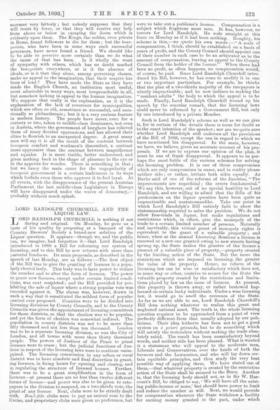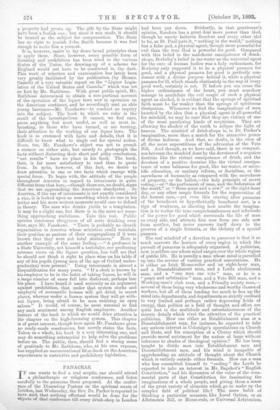LORD RANDOLPH CHURCHILL AND THE LIQUOR LAW, T ORD RANDOLPH
CHURCHILL is nothing if not daring and original On Monday, he gave us a taste of his quality by proposing at a. banquet of the Country Brewers' Society a brand-new solution of the Liquor question. It appears—though we, and the public too, we imagine, had forgotten it—that Lord. Randolph introduced in 1888 a Bill for reforming our system of licensing, and to this Bill ha now returns with more than parental fondness. Its main proposals, as described in the speech of last Monday, are as follows ;—The first object of the Bill was to give the granting of licences to a popu- larly elected body. This body was to have power to reduce the number and to alter the 'form of licences, The power to grant new lieences, except under certain limited condi- tions, was next restricted; and the Bill provided for pro.. hibiting the sale of liquor where a strong popular vote was recorded against it. The clause was, however, drawn in such a way that it constituted the mildest form of popular control ever proposed. Counties were to be divided into licensing divisions by County Councils, and to the County Councils was given the appointment of licensing committees for those districts, so that the election was to be popular, and yet the form of election was somewhat indirect. The population in county districts was not to be more than fifty thousand and not less than ten thousand. London was to be a separate licensing division, so was the City of London, and all towns with more than thirty thousand people. The powers of Justices of the Peace to grant licences were to cease ; but the judicial functions of Jus- tices in respect of the licensing laws were to continue unim- paired. The licensing commission in any urban or rural district was to have absolute and final discretion in grant- ing licences, in fixing hours for opening and closing, and in regulating the structure of licensed houses. Further, there was to be a great simplification in the form of licences—at present there are no less than twelve different forms of licence—and power was also to be given to rate- payers in the division to suspend, on a two-thirds vote, the grant of any licence. Next, clubs were to be strictly dealt with. Bond-fide clubs were to pay an annual sum to the Excise, and proprietary clubs were given no preference, but were to take out a publican's licence. Compensation is a subject which frightens most men. It has, however, no terrors for Lord Randolph. lie rode straight at this fence on Monday as if it bad been nothing. R,oughly, his scheme is this,—we quote his own words :—" A scale of compensation, I think, should be established on a basis of years of profit, and the County Council should appoint one of their number in each case to be an arbitrator as to the amount of compensation, leaving an appeal to the County Council from the holder of the Leonel)." When there had been no profit, as often happens, no compensation would, of course, be paid. Since Lord Randolph Churchill intro- duced his Bill, however, he has come to modify it in one or two important particulars. For example, he thinks that the plan of a two-thirds majority of the ratepayers is utterly impracticable ; and he now inclines to making the resident adults" the body to which the appeal is to be made, Finally, Lord Randolph Churchill wound up his speech by the oracular remark, that the licensing laws could never be reformed by a Government Bill, but only by one introduced by a private Member.
Such is Lord Randolph's scheme as well as we can give it, for in certain of the details there is room for doubt as to the exact intention of the speaker ; nor are we quite sure whether Lord Randolph still endorses all the provisions of the Bill of 1888, except the one in regard to which we have mentioned his disapproval. In the main, however, we have, we believe, given an accurate account of his pro- posals. If we are to express our opinion of the plan, it must be one of frank disapproval. It appears to us per- haps the most futile of the various schemes for solving the licensing problem. It is one of those compromises which are only compromises in name, and in reality please neither side ; or rather, irritate both sides equally. As Burke said of one of the reforms of the Jacobins, The improvements are superficial ; the errors fundamental." We say this, however, out of no special hostility to Lord Randolph, and are willing to admit that the Bills of his predecessors on the liquor question have been quite as impracticable and unstatesinanlike. Take one point in which Lord Randolph's Bill entirely fails to show the statesmanship required to solve the problem. We do not allow free-trade in liquor, but make regulations and restrictions which, in effect, give the monopoly of the trade to a certain limited number of persons. Naturally and inevitably, this virtual grant of monopoly rights is equivalent to the grant of a valuable property ; and hence, when at the annual Licensing Sessions a licence is renewed or a new one granted owing to new streets having sprung up, the State makes the grantee of the licence a present of a valuable piece of property,—property created by the limiting action of the State. But the more the restrictions which are imposed on. licensing, the greater the value of the property. Hence, no reform of the licensing law can be wise or satisfactory which does not, in some way or other, contrive to secure for the State the valuable property created by the restrictions and limita- tions placed by law on the issue of licences. At present, this property is thrown away, or rather bestowed hap- hazard on certain lucky individuals. Under a wise licensing law, it would go to swell the revenues of the State. As far as we are able to see, Lord Randolph Churchill's Bill does nothing whatever to realise this great and neglected national asset. The truth is, the whole licensing question requires to be approached from a. point of view perfectly different from that usually adopted by our poli- ticians. Their idea hitherto has been not to get a good system on a, priori grounds, but to do something which will satisfy the teetotalers without making the trade abso- lutely rabid. The result has been unsatisfactory beyond words, and neither side has been pleased. What is wanted is a statesman who will appeal to the moderate men, Liberals and Conservatives, over the heads of both the brewers and the Lawsonites, and who will lay down cer- tain equitable principles, and then study the very best possible way of applying them. We have stated one of them,—that whatever property is created by the restrictive action of the State shall be secured to the State. Another is, that the licensing body shouldnwotil,lahavsine aSliirtWhe exist- ing We court's Bill, be obliged to say,' public-houses or none,' but should have power to limit and reduce the number at will. Next, we would provide for compensation wherever the State withdrew a facility for earning money granted in the past, under which a property had grown up. The gift by the State might have been a foolish one ; but since it was made, it should. be treated as the subject for compensation. The State has no right to punish John Smith because it was fool enough to make him a present. It is, however, easier to lay down broad principles than to apply them. Since, however, every possible form of licensing and prohibition has been tried in the various States of the Union, the drawing-up of a scheme for England would not have to be conducted in the dark. This work of selection and examination has lately been very greatly facilitated by the publication (by Messrs. Cassell) of a very valuable report on the " Liquor Legis- lation of the United States and Canada," which was sot on foot by Mr. Rathbone. With great public spirit, Mr. Rathbone determined. to obtain a non-partisan account of the operation of the liquor laws now in operation on the American continent, and he accordingly sent an able young barrister—Mr. Fanshawe—to conduct an inquiry into the subject. The book to which we refer is the result of the investigations. It cannot, we feel sure, prove anything but most useful, as well as most in- teresting, to those who have turned, or are turning, their attention to the working of our liquor laws, The book is so crammed with facts and details, that it is difficult to know what to single out for special notice. Since, too, Mr. Fanshawe's object was not to preach a, sermon on either side, but merely to photograph the facts without distorting their short and pithy conclusions, "net results" have no place in his book. The book, then, is far more satisfactory to read than to quote from. In spite, however, of this fact, we desire to draw attention to one or two facts which emerge with special force. To begin with, the attitude of the people throughout America in regard to intoxicants is quite different from that here,—though there are, no doubt, signs that we are approaching the American standpoint, In America, if the use of intoxicants is not exactly considered a vice, it is looked upon as something which no one in his better and his more serious moments would care to defend in theory. The man who drinks yields to a temptation. It may be a slight one, but there is in the mere act some- thing approaching sinfulness. Take this test. Public opinion condemns clergymen of all sorts drinking even beer, says Mr. Fanshawe. There is probably no church organisation in America whose ministers could maintain their position as pastors of their congregations if it were known that they were not total abstainers." Here is another example of the same feeling :—" A professor in a State University, not himself a teetotaler, nor professing extreme views on the liquor question, has told me that he should not think it right to place wine on his table if any of his pupils (young men of the age of Oxford under- graduates) were present." Using intoxicants is almost a disqualification for many posts. "If a clerk is known by his employer to be in the habit of taking liquor, he will in a large number of cases fall into disfavour, perhaps lose his place. I have heard it used seriously as an argument against prohibition, that under that system clerks and employs of mercantile houses will get drink in secret places, whereas under a licence system they will go with- out liquor, being afraid to be seen entering an open saloon." It would, of course, be most unusual to find any such sentiment among English employers. Another feature of the book to which we would draw attention is the chapter on the high-licensing system. This chapter is of great interest, though here again Mr. Fa,nshawe gives no ready-made conclusions, but merely states the facts. Taken as a whole, his book is a very interesting one, and may do something substantial to help solve the problems before us. The public, then, should feel a strong sense of gratitude to Mr. Rathbone, who, at his own expense, has supplied an unconventional Blue-book on the American experiments in restrictive and prohibitory legislation.







































 Previous page
Previous page